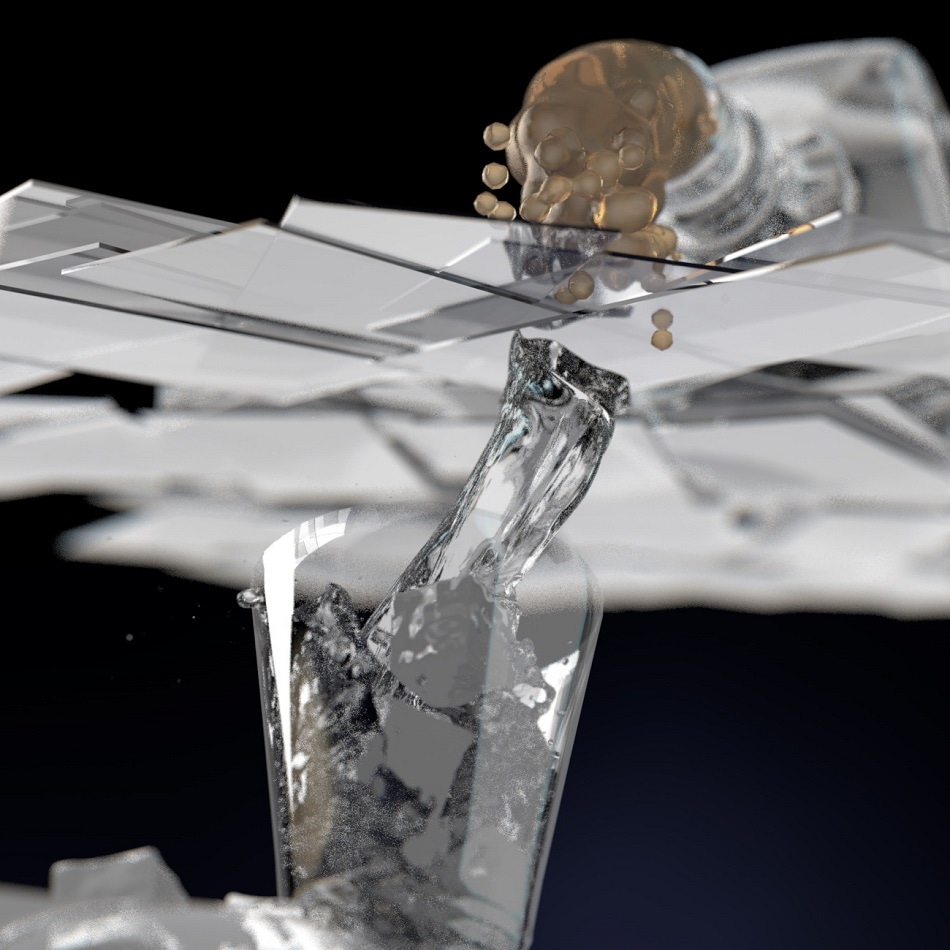 Image Credit: The University of Manchester
Image Credit: The University of Manchester
Ultrathin graphene-oxide membranes capable of filtering whisky to make it as clear as water have been developed by researchers at the University of Manchester.
Previously, such membranes were shown to be completely impermeable to all solvents except water, but a team at the University’s National Graphene Institute have tailored the membrane to allow all solvents to pass through without compromising the sieve’s ability to separate out the smallest particles.
In the newly developed ultrathin membranes – described in Nature Materials – graphene-oxide sheets are assembled so that pinholes formed during assembly are interconnected by graphene nanochannels. This results in an atomic-scale sieve allowing the large flow of solvents through the membrane.
The research – led by Professor Rahul Nair of the National Graphene Institute and the School of Chemical Engineering and Analytical Science – enables expansion in the applications of graphene-based membranes from sea water desalination to organic solvent nanofiltration (OSN). Unlike sea water desalination – which separates salts from water – ONS technology separates charged or uncharged organic compounds from an organic salt.
To illustrate this, the scientists showed that the graphene-oxide membranes can be designed to completely eliminate various organic dyes as small as a nanometer dissolved in methanol.
Just for a fun, we even filtered whisky and cognac through the graphene-oxide membrane. The membrane allowed the alcohol to pass through but removed the larger molecules, which gives the amber color. The clear whisky smells similar to the original whisky but we are not allowed to drink it in the lab, however it was a funny Friday night experiment!
Professor Rahul Nair, The National Graphene Institute and The School of Chemical Engineering and Analytical Science, The University of Manchester
The newly developed membranes not only filter out small molecules but increase the filtration efficiency by increasing solvent flow rate. Professor Nair commented, “Chemical separation is all about energy; various chemical separation processes consume about half of industrial energy usage. Any new efficient separation process will minimize the consumption of energy, which is in high demand now. By 2030, the world is projected to consume 60% more energy than today.”
Research Associate at the National Graphene Institute, Dr Yang Su, who has narrated the video below, and led the study with Professor Nair, adds, “The developed membranes are not only useful for filtering alcohol, but the precise sieve size and high flux open new opportunity to separate molecules from different organic solvents for chemical and pharmaceutical industries. This development is particularly important because most of the existing polymer-based membranes are unstable in organic solvents whereas the developed graphene-oxide membrane is highly stable.”
The graphene-oxide membranes developed at the National Graphene Institute have attracted widespread attention for water filtration and desalination applications because they could provide a potential solution to water scarcity. This is the first clear-cut experiment to demonstrate how other solvents can be filtered out using ultra-thin membranes, proving that there is potential for organic solvent nanofiltration.
This research has changed the perception of what graphene-oxide membranes are capable of, and how we can use them; by being able to engineer these membranes to filter out specific molecules or solvents it paves the way for potential new uses that have so far remained unexplored.
Graphene was isolated at the University of Manchester in 2004 by Professors Andre Geim and Konstantin Novoselov, who simply removed flakes of the material from a lump of graphite using sticky tape. The duo went on to win the Nobel Prize in Physics in 2010 for their work.
The unique two dimensional material can be both hydrophobic and hydrophilic. It is also two hundred times stronger than steel, yet flexible and bendable, and is one million times thinner than a human hair. It is also a fantastic conductor – so good that even helium can’t pass through it.
How can graphene help desalination?
Disclaimer: The views expressed here are those of the author expressed in their private capacity and do not necessarily represent the views of AZoM.com Limited T/A AZoNetwork the owner and operator of this website. This disclaimer forms part of the Terms and conditions of use of this website.